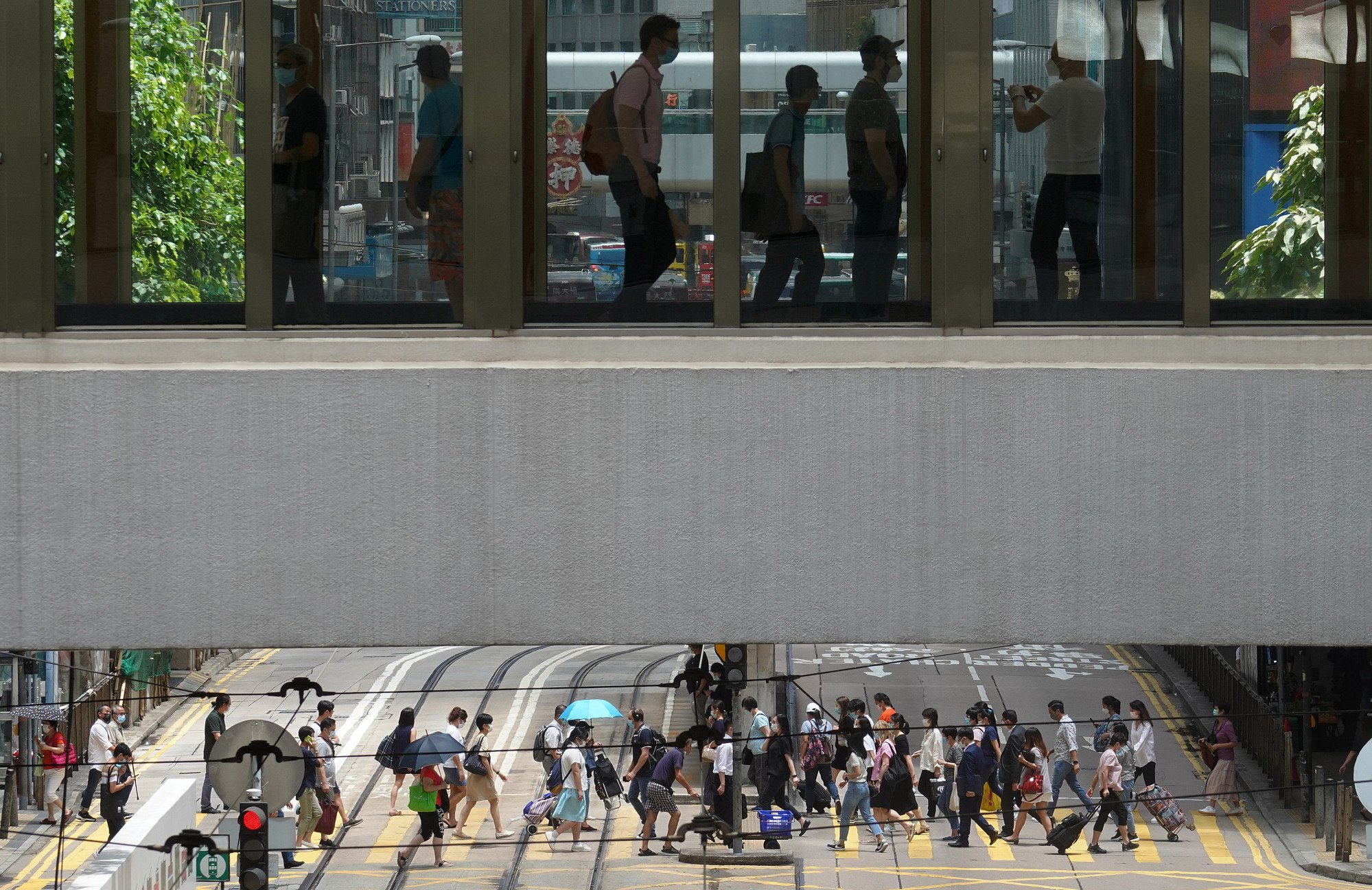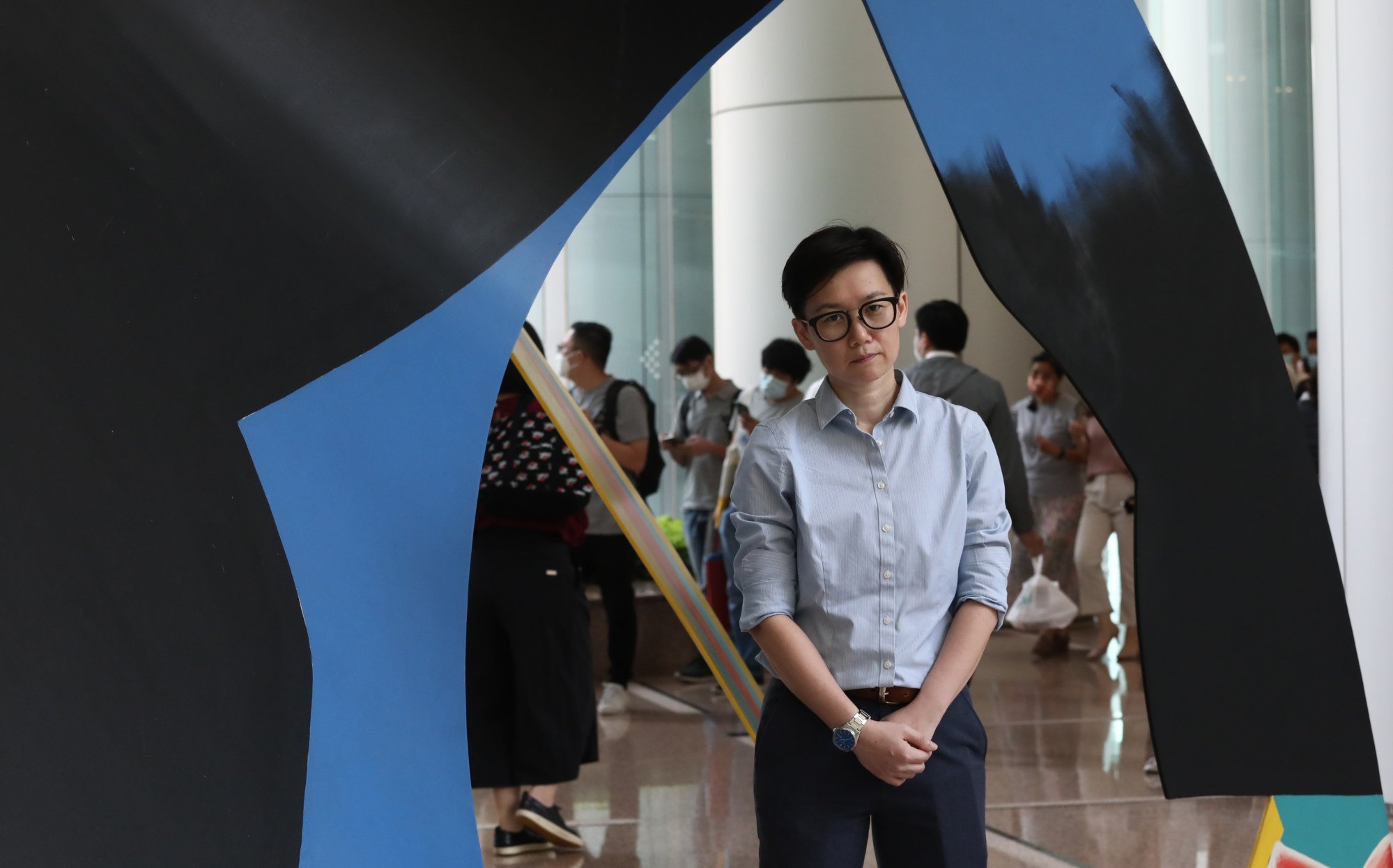
Go back to the office? No thanks, say Hongkongers who prefer work-from-home arrangements for flexibility and lifestyle balance
- Many employees find flexible work arrangements a more appealing way to get the job done, but bosses not convinced
- Employers resisting calls for more flexibility worry about productivity and loss of in-person interaction
In the first of a two-part series, the Post looks at the future of office arrangements in Hong Kong as many employees now prefer the flexibility of working from home after being under remote measures during the pandemic.
When his 69-year-old widowed mother had a stroke last September, Hong Kong resident Alan Francis flew immediately to be with her in Penang, Malaysia, and then travelled back and forth while she recovered.
Needing more flexibility than his job at an economic forecasting firm could provide, he switched to a part-time arrangement.
As his mother’s health improved, Francis opted for a flexible work arrangement he had not tried before.
He juggled a new role, as a director at recruitment consultancy firm Cleverly Search, with part-time employment at his former firm, splitting his time between working at home and at the offices of both companies on Hong Kong Island.

“I appreciate that if I work from home, I don’t have to commute. I can be flexible in terms of wherever I’m meeting clients,” he said.
He enjoys the new arrangement, aware that many traditional employers in Hong Kong have begun insisting that staff show up in the office five days a week.
“Even though they say they believe in work-life balance and are modern, in reality, they want people in the office every day,” he said.
The Covid-19 pandemic accelerated changes in the workplace, with remote working becoming common. Attitudes among workers shifted too, with more caring about their well-being and having flexibility.
The big question now, for Hong Kong employees and employers alike, is: will working from home, or anywhere else for that matter, remain post-pandemic?
By all accounts, the answer for employees is an overwhelming yes. But employers – especially the city’s more traditional firms – want their people back in the office.
Employers say collaboration and mentorship are harder when people are not in the office. But many workers who had a taste of working from home during the pandemic are loathe to give it up, and unafraid to vote with their feet by quitting to find new jobs offering more flexible arrangements.
Numerous multinationals, such as Apple, Google, Starbucks, Goldman Sachs and Amazon, have adopted a hybrid model requiring employees to be in the office a certain number of days each week.
Work from home is here to stay and will reverse PC sales slump, Acer CEO says
Accounting giant PwC surveyed 1,043 employees across the city in March last year and found nine out of 10 in Hong Kong preferred to work remotely, but only 45 per cent actually had that choice.
A study by recruitment agency Randstad last year showed two in five Hongkongers aged between 18 and 25 quit their jobs because they did not have enough flexibility in terms of their working location and hours.
Another survey last year, by co-working company The Instant Group, found that Hongkongers spent an average of 41 hours at work every week, the third highest in the Asia-Pacific after Singapore and mainland China, and with an average of only seven days of annual leave. Just over one in four said they were happy at work.
‘A line between work and personal life’
Hilda Poon, in her 40s, a senior manager at a multinational professional services firm, said seeing her colleagues at the office after pandemic restrictions eased last year felt like meeting “new friends”.

During videoconferencing calls during the pandemic, it was common for her Hong Kong and mainland Chinese colleagues to keep their cameras switched off, whereas her Western ones were happy to show their faces.
Her company has a flexible working arrangement, and Poon said some of her team of five chose to be in the office five days a week because their flats were small or there were others at home.
Poon, who lives with her girlfriend, said she stayed home some days but preferred being in the office to draw a line between work and private life.
“The pandemic work-from-home arrangement helped us move to this flexible mode of working, but the downside is that the boundary between work and your private life seems to be fake,” she said. “I would rather come to the office purely because I want to have that boundary.”
A chic, urbane studio apartment where even the light switches are luxe
Margaret Chan*, a designer at a multinational consultancy, said she was “strongly encouraged” to return to the workplace last year when her firm organised office events or happy hour drinks to get people together in person.
During the pandemic, the company moved to new premises where employees no longer had their own workspaces. Instead, there were now shared “hot desks” and people just worked at any free spot when they came in.
Like most of her team, Chan, 28, goes in once or twice a week to see her colleagues and attend meetings. On other days, she works from the two-bedroom flat she shares with her boyfriend in North Point.
Hong Kong jobless rate drops to 3.3 per cent, marking 11th straight decline
“I like working from home, but sometimes it feels a little distant from my teammates. It’s a good idea to gather in the office, and maybe have lunch together. The team culture is important,” she said.
‘No face time between managers, workers’
While some Hong Kong firms were willing to experiment with flexible working, most were not.
Last year, New World Development, one of the city’s largest employers, piloted a 4½-day work week for some 4,000 staff and allowed people to work from home one day a week.
At the time, other major developers such as Sun Hung Kai Properties, Henderson Land Development and Sino Land all said they would continue to implement a five-day work week, with employees expected in the office.
New World’s trial ran for three months from July to September, with no word from the company if the flexible arrangements would continue, according to an employee.
Albert Lee, a co-founder of recruitment firm NLSearch, said most traditional employers in Hong Kong found it hard to embrace working from home as they felt it affected productivity.
Hundreds visit Hong Kong job expo hoping to grab one of 4,700 openings
To accommodate employees’ preferences, however, some employers had opted for a hybrid week, allowing people to work from home for a certain number of days.
“During Covid, people weren’t chatting in the office pantry … and lost a lot of bonding time,” he said. “Managers didn’t get as much face time with their employees.”
Gary Ng Cheuk-yan, a senior economist with Natixis Corporate and Investment Bank, said Hong Kong’s demanding work culture meant the city was not moving as quickly as many other places in allowing flexible working arrangements because many traditional firms did not see the advantages.
“They want you in the office, probably working hours that are slightly longer,” he said. “There are many ways to measure productivity, but one is probably the time you spend in the office.”
Mid-century touches, homelike vibes: this is an office you won’t want to leave
Stephen Koss, Asia-Pacific workforce advisory leader of EY, one of accountancy’s four big players, said it was typical for most organisations to want their employees coming back to the office.
As for productivity, he said: “It does come down to trust.”
He said that during the pandemic, many employers struggled initially to grasp how employees performed while working remotely, but they now recognised they needed an element of trust and a good cultural environment to allow for open conversations between staff and managers.
Modern meets minimalist in Japanese-inspired makeover of Hong Kong home
Still, he said he believed the office was here to stay.
“There is a human need to connect with other people and I don’t see that going away,” he said. “It will continue to evolve.”
Work anywhere – the future of the office?
When Ankit Suri hired his first group of 10 employees for Planto, a Hong Kong-based online banking solutions provider he co-founded, they all worked at Cyberport, a government-funded tech community for start-ups.
During the pandemic, when some employees moved back to their home countries and it was hard to find local tech talent, the 31-year-old looked overseas for employees and established a remote working culture.
Fewer than half of his 20 employees now are in Hong Kong. The rest work out of Taiwan, Singapore, Malaysia, Pakistan and Canada.
Suri said it mattered less to him that employees were at their desks at 9am, than that they achieved their weekly targets.
How digital nomads have reinvented work and tourism officials have reacted
He conceded that it worked well because it was a small outfit, and it was a challenge that he did not see his employees and they did not meet each other.
“In a remote set up, how do you know people are talking to each other? How do you know people are motivated? How do you know people like the company?” he said.
Recognising that, the company is planning to bring all employees together in Southeast Asia for an off-site event, where colleagues can meet, get updated on the company’s plans and attend a workshop to learn new skills in product development. Some will be meeting in person for the first time.
Economists and recruiters expected the tug of war between those who resist returning to the office and their bosses to continue.
“The cat’s out of the bag,” said Mark Francis, who founded recruitment consultancies Silverstrand and Cleverly Search, where his brother Alan also works.
Why are digital nomads flocking to the Chinese city of ‘Dalifornia’?
Francis, who also co-founded Zetl, a Hong Kong and Singapore-based fintech start-up, said people with young children or pets, in particular, wanted to have flexibility at work.
If that was not an option, it could lead to attrition, with people leaving larger organisations for mid-size or smaller firms, he added.
Sid Sibal, vice-president of Greater China and head of Hong Kong at search firm Hudson, said fresh graduates were happy to come into the office every day.
Employees with three years or more experience wanted flexibility, whereas “old school managers” wanted their staff in the office.
He said: “It is still going to be a tug of war between employees and employers, but companies will reach a point where they will have to define, regardless of business performance, what do we stand for here?”
The next Bali? Taiwan city tries to lure remote workers amid talent shortage
For one Hongkonger, working from home opened a door to an entirely new lifestyle combining earning a living with travel.
Stuck at home and working remotely, freelancer Tiffie Cheung Hoi-tung wondered last year if there was a better way to do her job in marketing and events.
She took off for Chiang Mai, in northern Thailand, a popular location for digital nomads – people who use technology to travel and work from anywhere.
One of her Hong Kong clients did not like that she was away while working and dropped her.
But, with almost 10,000 followers on her Instagram page, Cheung began getting requests from people drawn to her digital nomad lifestyle.
That led to setting up a consultancy, allowing her to charge for individual advice. She continues to work in digital marketing and social media management.
Speaking to the Post from her current location in Kanazawa, Japan, she said she earned more than HK$30,000 (US$3,828) per month working four or five hours a day.
“I feel like I have a purpose in life,” she said. “I have to work to pay for the things I enjoy, so I finish my work quickly.”
*Name changed at interviewee’s request.


